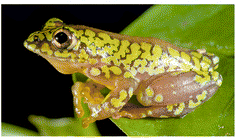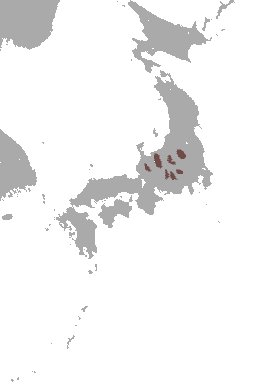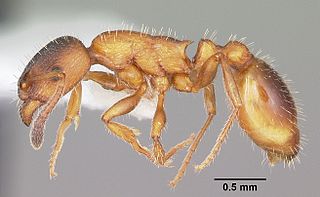
The Eurasian least shrew, also called the lesser pygmy shrew, is the second-smallest mammal by mass after the Etruscan shrew.
Leptothorax pocahontas is a threatened species of ant endemic to Alberta, Canada, facing a high risk of extinction.

Hyperolius minutissimus is a species of frog in the family Hyperoliidae. It's common names are tiny reed frog and dwarf reed frog. It is endemic to Tanzania and known from the Udzungwa Mountains and from near Njombe in the Southern Highlands.
Thorius minutissimus is a species of salamander in the family Plethodontidae. It is endemic to Mexico. It is known only from one site near Santo Tomás Teipan in the Sierra Madre del Sur of Oaxaca, in pine–oak forest at 2,458 meters elevation. Its extent of occurrence (EOO) is 10 km2, which represents the single location.

The arrowhead piculet or Guianan piculet is a species of bird in subfamily Picumninae of the woodpecker family Picidae. It is found in Suriname and possibly French Guiana and Guyana.

The Azumi shrew is a species of mammal in the family Soricidae. It is endemic to Japan, where it is found in the mountainous regions of central Honshu Island. It is a close relative of the Eurasian least shrew. It is threatened by habitat loss.

Leptothorax goesswaldi is a species of ant in the genus Leptothorax. It is found in France and Switzerland.

Leptothorax kutteri is a species of ant in the genus Leptothorax. It is endemic to Europe, Germany, Sweden, and Switzerland.

Leptothorax pacis is a species of ant in the genus Leptothorax. It is endemic to Switzerland.
Leptothorax buschingeri is a species of ant in the genus Leptothorax. It is endemic to Switzerland.

Leptothorax is a genus of small ants with mainly Holarctic distributions. The genus is notable for its widespread social parasitism, i.e. they are dependent on the help of workers from other ant species during a part or the whole of their life cycles.

Leptothorax duloticus is a species of especially hostile slave-maker ant in the subfamily Myrmicinae. It is endemic to the United States.
Leptothorax faberi is a species of ant in the genus Leptothorax. It is endemic to Canada.

Leptothorax recedens is a species of ant in the family Formicidae. It is found in France, Italy, and Spain, with the most recent finding in Slovenia.

The Alaska tiny shrew is a species of shrew. It is endemic to Alaska.

Leptothorax acervorum is a small brown to yellow ant in the subfamily Myrmicinae. It was first described by Johan Christian Fabricius in 1793. L. acervorum is vastly distributed across the globe, most commonly found in the coniferous forests of Central, Western and Northern Europe. The morphology of L. acervorum is extremely similar to that of other Leptothorax ants. The difference arises in the two-toned appearance of L. acervorum, with the head and metasoma being darker than the mesosoma segment of the body, and hair across its body. Following Bergmann's rule—unusually, for ectothermic animals—body size increases with latitude.

Leptothorax muscorum is a species of ant of the genus Leptothorax that ranges through a variety of habitats throughout much of Europe, northern Asia, and North and Central America, with a particularly wide distribution in the palearctic. Capable of surviving in extreme Arctic-Alpine conditions, the species is perhaps the northernmost dwelling ant indigenous to the Western Hemisphere.

Leptothorax longispinosus is an American species of ant.













